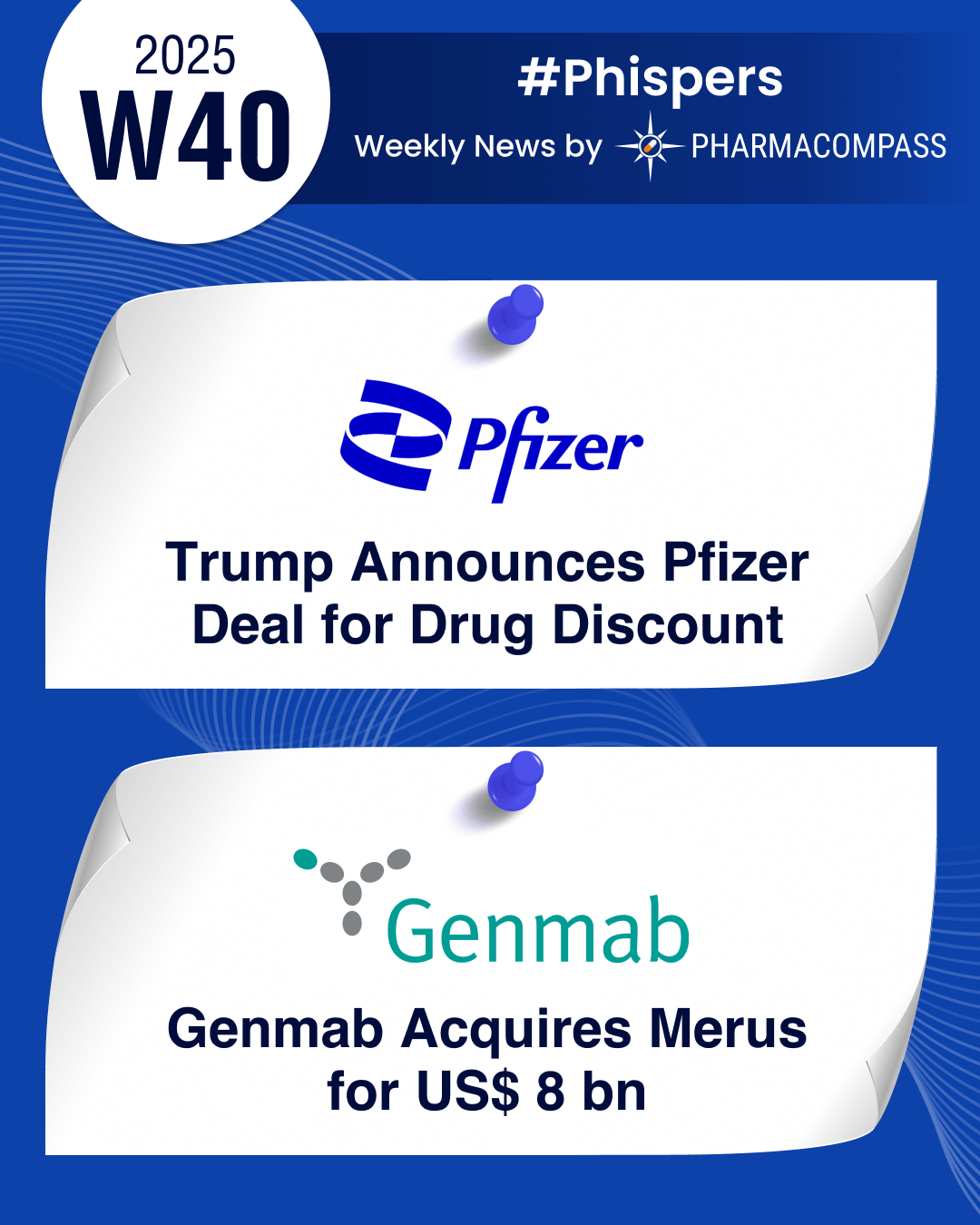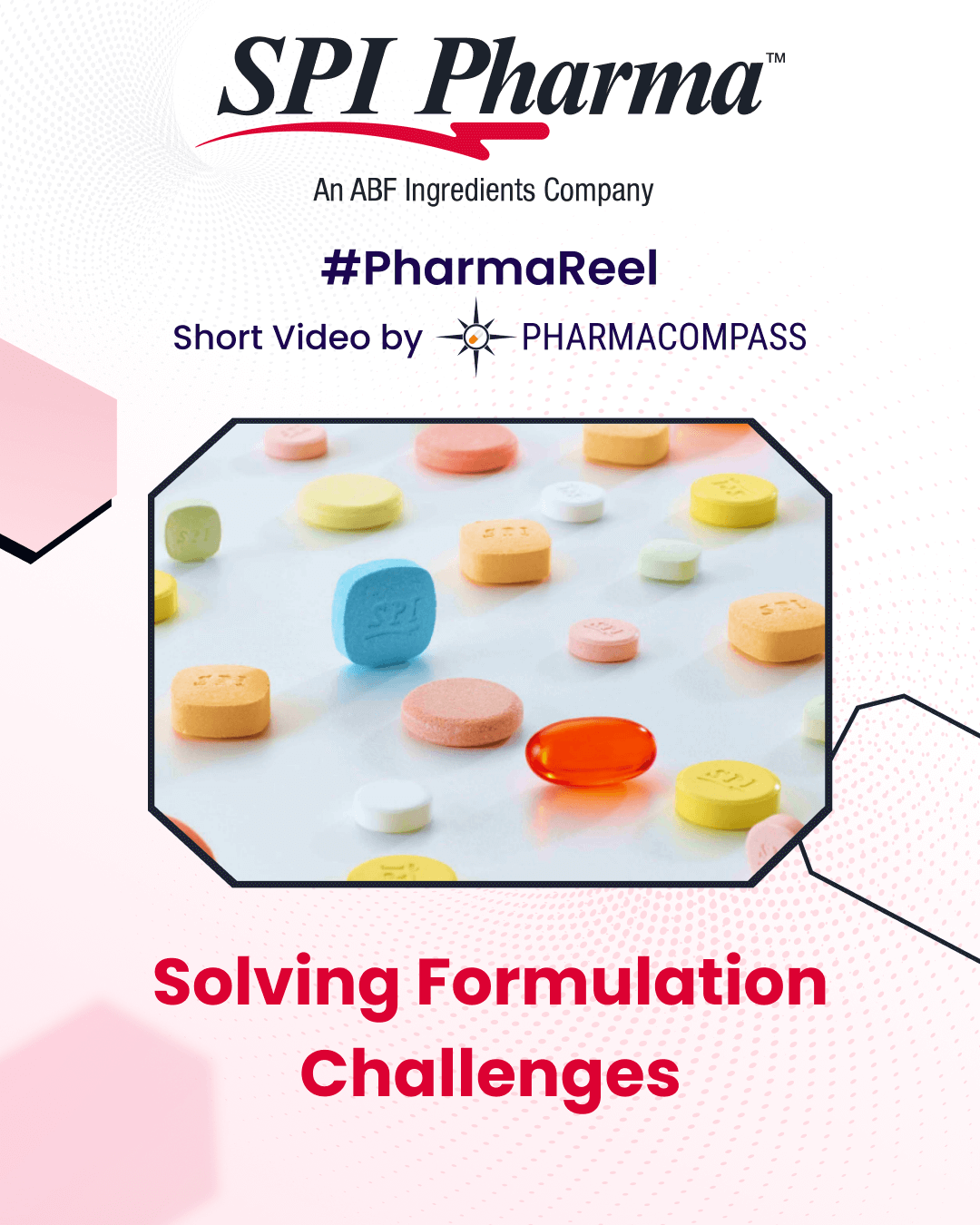
By PharmaCompass
2025-10-02
Impressions: 820 Article || 57 Video
This week, US President Donald Trump announced a deal with Pfizer to sell medicines through a new federal website, TrumpRx.gov, offering substantial discounts for patients not using insurance. Separately, Trump signed an executive order to boost AI research for childhood cancers with US$ 50 million in grants. In another major deal, Genmab announced an US$ 8 billion acquisition of Dutch biotech Merus, strengthening its late-stage cancer pipeline.
Meanwhile, Asian pharmaceutical markets faced pressure as 100 percent US tariffs on branded and patented drugs took effect on October 1.
In approvals, the FDA cleared multiple drugs, including Eli Lilly’s oral breast cancer drug, Crinetics’ pill for a rare hormonal disorder, and Regeneron’s shot for young children with a rare genetic disorder. Novartis also secured FDA approval for an oral pill to treat adults with a chronic skin condition.
In clinical trials, MoonLake’s sonelokimab faced a setback in phase 3 studies for an inflammatory skin condition, while Merck’s Winrevair showed strong efficacy in pulmonary arterial hypertension.
Trump announces deal with Pfizer to sell drugs directly to patients at lower prices
President Trump announced a deal with Pfizer to sell medicines through a federal website, TrumpRx.gov, offering discounts averaging about 50 percent and reaching as high as 85 percent for patients not using insurance. Pfizer also agreed to launch new drugs at the same price in the US as in other developed countries and to offer most-favored-nation pricing for Medicaid, the government program providing health coverage for low-income Americans. The deal includes a US$ 70 billion investment by Pfizer to reshore US drug manufacturing and a three-year tariff grace period. Pfizer’s shares increased by more than six percent on the day of the announcement.
Separately, Trump signed an executive order to boost AI research for childhood cancers, providing US$ 50 million in grants to improve clinical trials, treatments, and prevention strategies. Meanwhile, PhRMA, a US pharmaceutical lobby group, has announced it will launch AmericasMedicines.com in January, letting drugmakers sell medicines directly to patients and connect them with programs offering lower prices.
Healthcare stocks in US & Europe surge on Pfizer deal: US and European healthcare stocks rallied after the Trump-Pfizer deal. Europe’s healthcare sector index rose 5.3 percent a day after the announcement of the deal, its biggest one-day gain since 2008. The agreement, seen as less harsh than expected, offers drugmakers clarity after months of pressure over high US medicine costs.
Genmab buys Merus for US$ 8 bn to boost cancer drug pipeline
Genmab has announced an US$ 8 billion acquisition of Dutch biotech Merus, strengthening its pipeline of late-stage cancer therapies. The all-cash deal is expected to close in early Q1 2026. The acquisition gives Genmab full control of petosemtamab, a potential first- and best-in-class bispecific antibody for recurrent/metastatic head and neck cancer. Genmab hopes to bring the drug to market in 2027 if ongoing phase 3 trials succeed and projects US$1 billion in annual sales by 2029.
FDA approves Eli Lilly’s oral drug for advanced breast cancer
The FDA has approved Eli Lilly’s Inluriyo (imlunestrant), an oral drug for adults with advanced breast cancer who have received prior therapy. In a phase 3 trial, Inluriyo cut the risk of the disease getting worse or causing death by 38 percent compared with current hormone therapies. Inluriyo, taken as a once-daily pill, blocks estrogen receptors that drive tumor growth.
Okays Crinetics’ pill for rare pituitary disorder: The FDA has approved Crinetics’ Palsonify (paltusotine), the first once-daily oral treatment for adults with acromegaly. This rare hormonal disorder is caused by pituitary tumors that trigger excess growth hormone. Notably, this is the first FDA approval for the California-based company.
Clears Regeneron’s Evkeeza shot for children: The FDA has approved Regeneron’s Evkeeza (evinacumab-dgnb) for children aged 1 to under 5 with homozygous familial hypercholesterolemia (HoFH), a rare genetic disorder causing dangerously high cholesterol from birth. Evkeeza was initially approved in 2021 for adults and adolescents aged 12 years and older. It was then approved for children aged 5 to 11 in 2023.
Grants approval to Novartis’ Rhapsido for chronic hives: The FDA has approved Novartis’ oral pill Rhapsido (remibrutinib) for adults with symptoms of chronic spontaneous urticaria (a skin condition) despite standard therapies. The twice-daily pill, Rhapsido offers a convenient oral alternative to injectable therapies. Novartis is also testing the drug for other immune conditions.
Asian pharma markets take a hit as 100% US tariffs on branded drugs kick in
Asian pharmaceutical markets, including India, witnessed pressure as 100 percent US tariffs on imported branded drugs, announced earlier by Trump, took effect on October 1. Regardless, analysts say the impact may be limited, as India’s exports mainly consist of generic medicines, which are unlikely to face the tariffs. On the other hand, European and US pharma shares have remained largely steady. The tariffs target branded and patented medicines and aim to encourage drug production within the US.
Roche, Novartis say Trump’s 100% US tariffs unlikely to hit them: Swiss pharmaceutical giants Roche and Novartis said Trump’s 100 percent tariffs on imported branded and patented drugs, which took effect on October 1, are unlikely to impact them. Both companies are investing heavily in US manufacturing, which may be deemed sufficient for exemptions. Roche has begun building a Genentech facility in North Carolina and pledged US$ 50 billion for US manufacturing and R&D, while Novartis announced US$ 23 billion in US investments and plans to start five new sites by year-end.
MoonLake’s drug for skin condition hits speed bump in phase 3 trials; Merck’s therapy shows promise
MoonLake’s drug sonelokimab showed mixed results in phase 3 trials for hidradenitis suppurativa, an inflammatory skin condition. One trial met its main goals, while the other missed them due to a stronger-than-expected placebo response. MoonLake plans to discuss the results with regulators. Significantly, Merck & Co. made a nonbinding offer earlier this year valuing MoonLake at over US$ 3 billion. The bid, however, was rejected.
Merck’s Winrevair cuts risk of pulmonary hypertension worsening: Merck’s Winrevair (sotatercept-csrk), a first-in-class therapy for pulmonary arterial hypertension (PAH), was approved by the FDA in 2024 for adults with this rare, progressive lung disease to improve exercise ability and slow disease worsening. Now, new results from the phase 3 study show that Winrevair, when added to standard PAH treatments, reduced the risk of disease worsening by 76 percent in patients who were recently diagnosed.
The PharmaCompass Newsletter – Sign Up, Stay Ahead
Feedback, help us to improve. Click here
Image Credit : Phispers Infographic by PharmaCompass license under CC BY 2.0
“ The article is based on the information available in public and which the author believes to be true. The author is not disseminating any information, which the author believes or knows, is confidential or in conflict with the privacy of any person. The views expressed or information supplied through this article is mere opinion and observation of the author. The author does not intend to defame, insult or, cause loss or damage to anyone, in any manner, through this article.”








